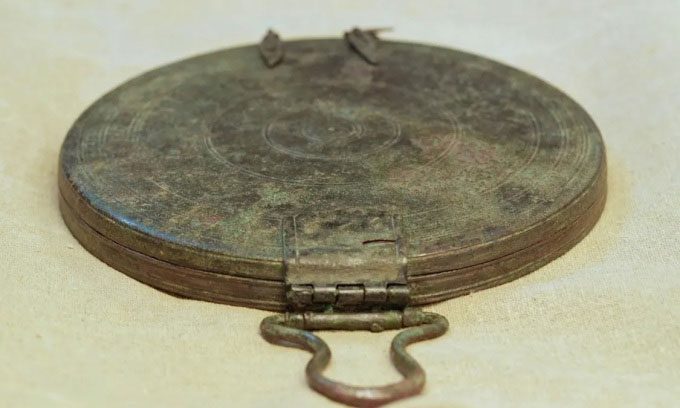Researchers Discover the Remains of a Likely High-Class Courtesan from Ancient Greece During the Time of Alexander the Great.
Along a road in Jerusalem, the remains of a woman were found alongside a series of bent iron nails and a rare bronze box mirror in excellent condition, indicating her status as a high-class courtesan serving a high-ranking Greek official, IFL Science reported on September 27.

Bronze box mirror buried with the woman’s remains. (Photo: Emil Aladjem/Israel Antiquities Authority)
Dating back to the 3rd or 4th century BC, the grave was located in a burial cave dug along a highway in southern Jerusalem. “This is actually the earliest evidence of cremation in Israel during the Hellenistic period,” stated Dr. Guy Stiebel, an archaeologist.
“The most interesting question about this discovery is why the grave of a Greek woman was located on the highway leading to Jerusalem, far from any settlement or site of that time?” Stiebel remarked. The answer may be revealed through the artifacts buried alongside her, as the box mirror is a gender-specific item, often associated with Greek women.
“The quality of the mirror’s production is so high that it has been preserved in excellent condition, looking as if it were made yesterday,” explained Liat Oz, an expert at the Israel Antiquities Authority. Luxurious and expensive items like this mirror were sometimes purchased by Greek women as part of their dowries in marriage, although married women typically stayed at home and certainly did not leave Greece.
Additionally, there was only one other way to receive an item like this. The box mirror may have been a gift from a political or military figure during the Hellenistic period to his courtesan, known as a hetaira. Hetairas accompanied generals and officials on foreign campaigns, providing various services, some of which may have been sexual in nature.
According to researchers, the presence of such an exquisite object alongside cremated remains suggests that this was the grave of a Greek woman who accompanied a senior member of the military or state during the Hellenistic period. Based on the dating of the grave, it is likely that the hetaira and the person she served came to Jerusalem during a campaign of Alexander the Great, or during the Wars of the Diadochi – the conflicts that erupted among Alexander’s generals over succession.




















































